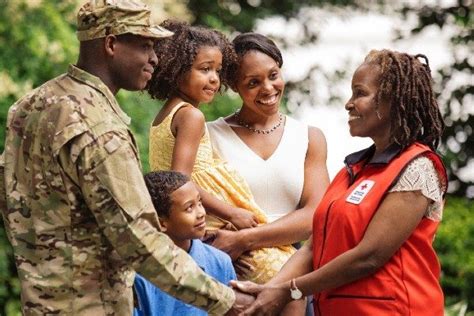5 Ways to Support Armed Forces Families

Supporting the Families of Our Heroes: 5 Meaningful Ways to Make a Difference

As we go about our daily lives, it’s easy to overlook the sacrifices made by the families of our armed forces. The spouses, children, and parents of service members often put their lives on hold, facing unique challenges and making incredible sacrifices in support of their loved ones. It’s essential that we show our appreciation and gratitude for their dedication and resilience. In this article, we’ll explore five meaningful ways to support armed forces families and make a positive impact on their lives.
1. Volunteer Your Time and Skills

Armed forces families often have to navigate complex challenges, from frequent relocations to managing the household while their partner is deployed. By volunteering your time and skills, you can make a tangible difference in their lives. Consider the following opportunities:
- Mentorship programs: Many organizations, such as the USO and Military Mentor, offer mentorship programs that match volunteers with armed forces families. You can provide guidance, support, and a listening ear to those who need it.
- Household assistance: Offer to help with household chores, such as grocery shopping, dog walking, or yard work. These small gestures can go a long way in alleviating stress and workload.
- Tutoring and education: If you have expertise in a particular subject, consider offering tutoring services to armed forces children. This can help them stay on top of their studies and provide a sense of stability during uncertain times.
🌟 Note: Be mindful of the families' schedules and availability. Respect their boundaries and prioritize their needs.
2. Provide Emotional Support and Connection

Armed forces families often feel isolated and disconnected from their communities. By providing emotional support and connection, you can help them feel seen, heard, and valued. Here are some ways to do so:
- Listening ear: Sometimes, all someone needs is someone to listen to them. Be present, attentive, and non-judgmental, and let them share their thoughts and feelings.
- Care packages: Put together care packages with items that show you care, such as comfort foods, cozy blankets, or uplifting books. These small gestures can bring joy and comfort to families during difficult times.
- Community events: Organize or participate in community events that bring armed forces families together. This can help them build connections, find support, and feel a sense of belonging.
3. Offer Practical Support and Resources

Armed forces families often face unique challenges, from navigating the healthcare system to managing finances. By offering practical support and resources, you can help alleviate some of these burdens. Consider the following:
- Financial assistance: Organizations like the Military Relief Fund and the USO provide financial assistance to armed forces families. You can donate or volunteer with these organizations to make a difference.
- Health and wellness: Offer to help with healthcare-related tasks, such as driving family members to appointments or providing childcare during medical procedures.
- Employment and education resources: Provide access to employment and education resources, such as resume-building workshops or online courses. This can help family members build their skills and find meaningful employment.
4. Advocate for Armed Forces Families

Advocacy is a powerful way to make a difference in the lives of armed forces families. By raising awareness and pushing for policy changes, you can help address some of the systemic challenges they face. Here are some ways to advocate:
- Contact your representatives: Reach out to your local representatives and express your support for armed forces families. Encourage them to pass legislation that benefits these families.
- Join advocacy organizations: Organizations like the Military Family Advisory Network and the National Military Family Association advocate for armed forces families. Join their efforts and add your voice to the conversation.
- Share their stories: Share the stories of armed forces families on social media, highlighting their challenges and triumphs. This can help raise awareness and build empathy.
5. Show Your Appreciation and Gratitude

Sometimes, the simplest way to support armed forces families is to show your appreciation and gratitude. Here are some ways to do so:
- Thank-you notes: Write heartfelt thank-you notes to armed forces families, expressing your gratitude for their sacrifices and service.
- Public recognition: Publicly recognize the contributions of armed forces families, whether through social media or community events.
- Special discounts and offers: Offer special discounts or promotions to armed forces families, providing them with a small token of appreciation.
As we wrap up this article, remember that every small gesture counts. By showing your support and appreciation for armed forces families, you can make a meaningful difference in their lives.
In conclusion, supporting armed forces families requires empathy, understanding, and a willingness to make a difference. By volunteering your time and skills, providing emotional support and connection, offering practical support and resources, advocating for their needs, and showing your appreciation and gratitude, you can help make a positive impact on their lives.
How can I get involved in supporting armed forces families?

+
There are many ways to get involved, from volunteering your time and skills to advocating for their needs. Start by researching local organizations and initiatives that support armed forces families, and reach out to them to see how you can help.
What are some common challenges faced by armed forces families?

+
Armed forces families often face unique challenges, including frequent relocations, deployments, and managing the household while their partner is away. They may also struggle with healthcare, education, and employment resources.
How can I show my appreciation and gratitude to armed forces families?

+
There are many ways to show your appreciation and gratitude, from writing thank-you notes to offering special discounts and promotions. You can also publicly recognize their contributions and share their stories on social media.